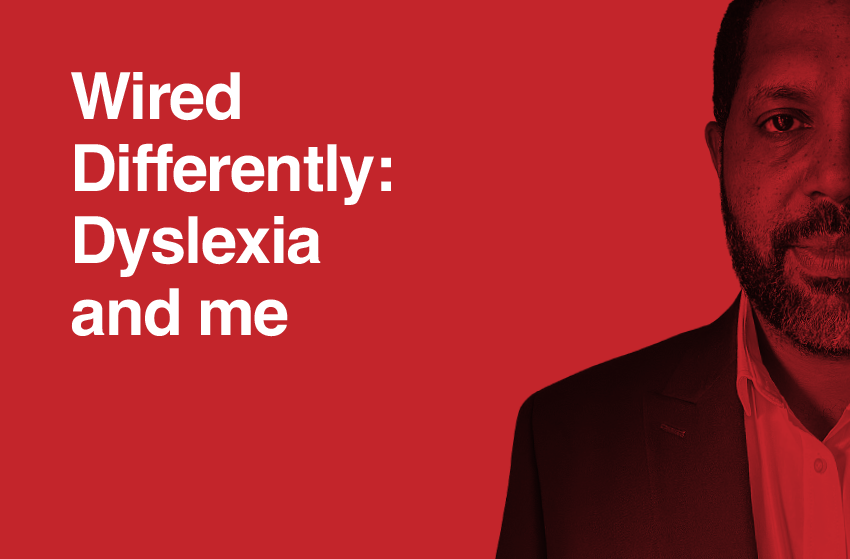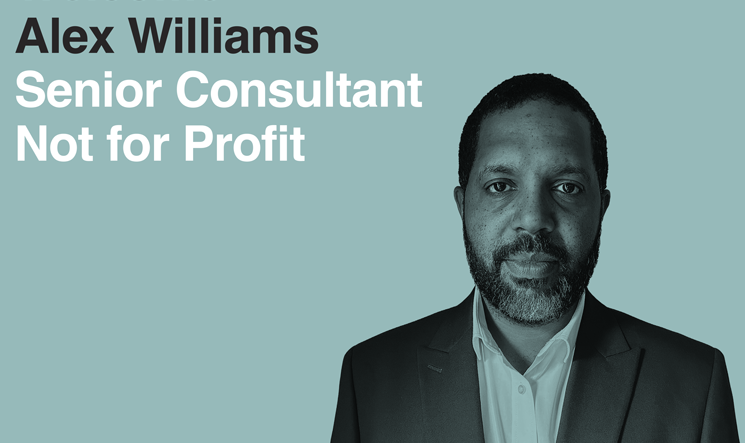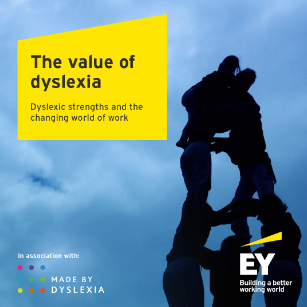Alex Williams, Senior Consultant in our Not for Profit practice, and member of the GS Disability Affinity Group shares his experiences of living with Dyslexia, how this has made him the person he is, and how to support someone with Dyslexia in the workplace
“Dyslexia has made me the person I am today: a skilled recruiter, an empathic leader and supportive colleague. I am proud to be made by Dyslexia!!”
– Alex Williams
What is Dyslexia?
“Dyslexia influences as many as 1 in 5 people and is a genetic difference in an individual’s ability to learn and process information. As a result, dyslexic individuals have differing abilities, with strengths in creative, problem-solving and communication skills and challenges with spelling, reading and memorising facts”.
– Griggs, K. (n.d.). Made by Dyslexia.
Read the EY report on the value of Dyslexia: Dyslexic strengths and the
changing world of work.
Why don’t people declare a disability?
“The most prevailing reason for non-disclosure is fear of repercussion in the form of discrimination. It is felt by many that as a result of disclosing a disability, opportunities for career progression will be negatively impacted”.
– Celebrating Disability (n.d.). Celebrating Disability.
Dyslexia and me
I had known from a young age that my brain was wired differently and that I saw the world from a slightly different angle and in slightly different colour palettes from my friends and family. I was very aware that I was having to work twice as hard as my peers to achieve any kind of academic success and was working even harder to try and blend in and be “normal” within the workplace environment, attempting to minimise the impact of stigma and discrimination as I tried to progress my professional career.
I was diagnosed with dyslexia at the age of 16. It was reassuring to know that there was a reason why I was experiencing my difficulties but also incredibly scary as I had never heard of dyslexia and what it would mean for my future and my career opportunities. During secondary school and college, I spent years trying to fit in or probably more accurately not stick out to avoid bullying and stigmatisation. This fear and lack of self-belief followed me through university and into my early professional career.
On reflection, I think I fell into sales and recruitment and have been successful because it plays into my dyslexic strengths of being resilient, problem-solving, having dynamic reasoning, being a collaborator, displaying strong empathy and interpersonal skills.
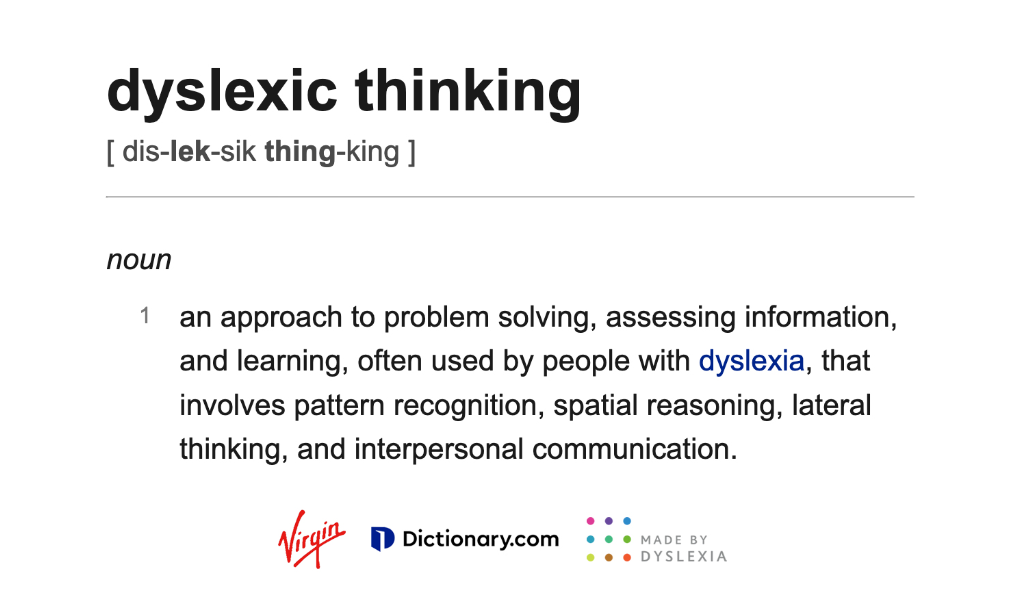
Dyslexic thinking – personal challenges
- Spelling and grammar: Despite using spell checks and rereading my emails and documents there will still be several errors which get much worse when I am tired or stressed. I often spent a huge amount of time trying to find the correct spelling or trying to use a thesaurus.
- Time Management: As a result of my spelling and grammar mistakes within my written content, I would often reread documents and emails multiple times before sending which could become almost paralysing when sending multiple-page interview reports or a detailed proposal.
- Poor Memory: Having to write down detailed notes, often trying to write down every word being spoken in every meeting, interview, or phone call to try and ensure I could remember everything became exhausting and I would then beat myself up about having to do this extra work.
- Asking lots of questions: I am interested in understanding how something works or why we do things in a certain way, which I believe is a key skill needed in leading a successful recruitment process. However, I have had managers who have misinterpreted this as me being challenging or disruptive.
Trying to hide my dyslexia whilst trying to combat my dyslexic limitations would just feed into feelings of Imposter syndrome. I have had colleagues particularly earlier in my career who have prided themselves on their written communication and would often make subtle but derogatory comments. It was not until I reached my late 30s that I finally became comfortable and confident enough to be vocal about my learning difficulty.
Dyslexic thinking – positive outcomes in the workplace
- An ability to quickly comprehend a situation and its impact: I’ve developed strong emotional intelligence due to the variety of difficulties and challenges I have faced. This intelligence has also evolved and developed into acute awareness skills, the ability to pre-empt risk, and empathise with the struggles of other people.
- Building relationships: To overcome my dyslexic limitations, I have honed my skills as a people person. I prefer speaking to someone over Teams, on the phone, or via WhatsApp instead of writing emails or messages. This has allowed me to build stronger connections and positive relationships with clients and colleagues, resulting in increased productivity and better collaboration in creating shared goals and purposes.
- Big-picture thinking and innovation: The ability to explore situations from multiple angles and the perspectives of others has been particularly critical in my role as a relatively new Chair of the Trustee board at Home-Start Southwark.
Utilising these skills enabled us to increase innovation, be more collaborative in our approach, and focus on identifying opportunities for improvement. This has been particularly important during the challenging external environment, difficult fundraising landscape, and the increasing complexity of the beneficiaries we support.
Dyslexic thinking is now officially recognised as a valuable skill – thanks to Richard Branson’s partnership with LinkedIn.
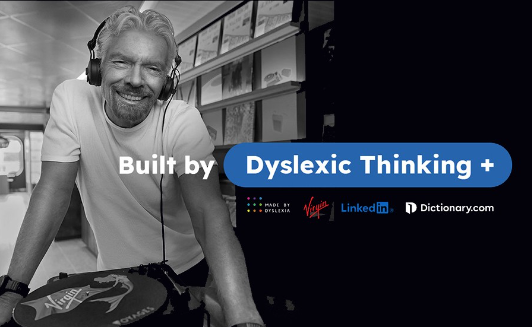
“Dyslexic thinking has been responsible for some of the biggest leaps mankind has ever made, from the light bulb to the motor car, the aeroplane to our exploration of space. So, it’s about time we redefined what it stands for. Recent research by Made By Dyslexia found that, in light of the rise of AI, dyslexics have the exact skills needed for the workplace of tomorrow, as set out by the World Economic Forum“.
– Richard Branson
How to support someone with Dyslexia in the workplace
Today we have many more tools to support individuals within the workplace with many organisations embracing the benefits from introducing more diversity within their workforce. Some of the tools and approaches I use include:
My email signature shows Clients and Candidates that I am Dyslexic.
1. Recording Interviews on Teams
I ask every candidate I interview if they would be okay with me recording our meeting to have a valuable resource to go back and check against my notetaking.
This a great resource for reviewing spelling, grammar, punctuation, and delivery mistakes in written content, and suggests replacements for the identified errors.
3. Read Aloud Software
This is a function that reads the entire document starting from your cursor location like an audiobook on email and Word documents.
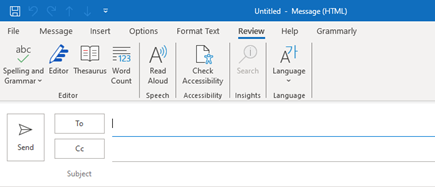
For managers, reasonable adjustments can include
- Creating a supportive work environment for dyslexic employees to feel a sense of belonging.
- Managers giving verbal as well as written instructions to employees.
- Supportive technology and software such as screen-readers and spell-checks.
- Managers allowing employees plenty of time to read, process, and complete tasks.
- Managers presenting employees with clear agendas and reports in advance of meetings.
- Sharing information in a range of formats including videos, charts, and audio version.
Resources for additional learning and support
- The British Dyslexia Association
- Made by Dyslexia
- Dyslexia Resource Centre
- Positive Dyslexia
- Celebrating Disability
- The Hidden 20% podcast
GatenbySanderson pioneer diversity and inclusion to find and develop leaders that shape a better society.
Organisations that embrace diversity at all levels perform better; they’re more profitable, more resilient and employees experience higher job satisfaction and productivity as a result. Contact us for more information
